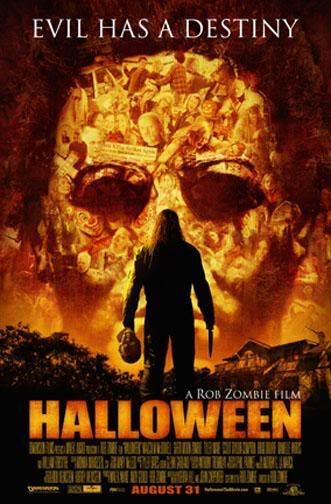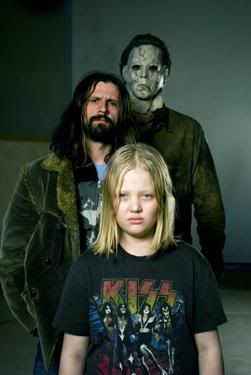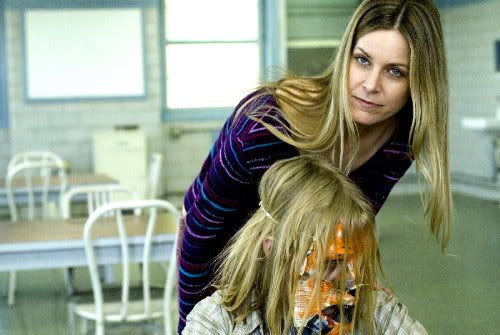As was the original, Halloween is essentially the story of a bogeyman, a black soul born bad (in the shape of young Michael Myers) and predestined for evil, who commits terrible things as a child and returns to the scene of his atrocities when he breaks out of an asylum some fifteen years later on Halloween night, where he focuses his grisly intentions on innocent teen Laurie Strode and her two (much more promiscuous) friends, Annie and Linda.
Of course, Zombie's film was never likely to break the ground that the original Halloween did nearly thirty years ago. After all, Carpenter's film virtually invented the stalk & slash/teens in peril horror genre that in the ensuing years has been used time and time again, in everything from the Friday the 13th and Nightmare on Elm Street series to the more recent Scream and I Know What You Did Last Summer films. The ground that seemed so fresh when Halloween first opened has now become thoroughly trod on, and it's hard to see anyone bringing any real freshness to the now overly predictable genre (Wes Craven probably came closest with his original Scream).
Fortunately, Zombie seems to realise this and doesn't try to re-invent the wheel. Instead, what he chooses to do is flesh out Michael Myers' back story; the hellish home life with an abusive step-father, the school bullies who torment him with sexual stories about his mother (who works as a stripper at a seedy bar) and – after he commits his original series of killings – the relationship he forms with his psychologist, Dr. Sam Loomis (the only person who seems to understand what a true embodiment of evil that Myers is). We also get to see the reasons why Michael Myers focused his deadly intentions on Laurie (something that wasn't revealed until the second film in the original series) and the origin of his famous mask (which for trivia buffs, was an unpainted William Shatner/Captain Kirk mask produced by the famous Don Post studios).
As a result, Zombie's Halloween is almost a film of two halves, the first half being a prequel of sorts, with the second half being a remake of Carpenter's original. And it's actually the first half of the film that is the most effective, even though it also demystifies Michael Myers to a certain extent (Carpenter never delved too deeply into Myers' background or family life, which made him a bit more mysterious and wraith-like). Brutal, extremely violent, sleazy and loud, the first half of Halloween sees Zombie clearly in his element, while by comparison the second half sees him struggling to bring anything new to the genre (it doesn't help if you have seen the original many times and have become overly familiar with the way the plot pans out). Nevertheless, the film as a whole works extremely well as a commercial horror film that has a bit of real dirt under its fingernails.
Naturally, given Rob Zombie's background as a musician (both as a solo artist and with his band White Zombie), Halloween has a strong aural landscape, with music composed by Tyler Bates and a soundtrack that booms with some classic 70s arena rock tracks such as Blue Oyster Cult's Don't Fear the Reaper, Alice Cooper's Only Women Bleed, Rush's Tom Sawyer and God of Thunder by KISS (which opens the film).
The best film in the series since the 1978 original (which is admittedly not saying a lot considering some of the truly dire sequels), Halloween is also Rob Zombie's most accomplished film to date from a technical and dramatic viewpoint, although some of his die-hard fans may miss the sheer craziness and truly psychotic characters which populated his first two films. An unrated two-disc Director's Cut of the film is due out on DVD in the US mid-December.
Copyright John Harrison 2007




